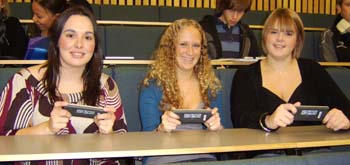Instant Feedback for students

Students at Lancaster University Management School will be able to receive instant feedback in lectures with the help of technology similar to that used in the TV Programme “Who Wants To Be A Millionaire?”
The £15,000 Radio Frequency Personal Response System (PRS) is used to test students’ understanding through a series of questions. These questions may take a number of formats; true/false, multiple choice, numerical or ordering of answers - as used on the Ask the Audience part of the television programme ‘Who Wants to Be a Millionaire?’
Each student is provided with a handset with which they register their vote for the correct answer. The amount of time given to answer questions may be adjusted depending on the type of question being asked. When the students have answered questions, a chart summary of voting will appear on screen, providing instantaneous feedback on the students’ understanding of course material.
Dr Wendy Beekes and Dr Caroline Elliott of Lancaster University Management School have received funding from LUMS IT Committee and the Friends Programme to implement the system in the Management School.
Dr Beekes, who has used the system with her Accounting and Finance undergraduate classes, said: “The PRS can be used to check students’ understanding in an informal way by using the system anonymously. This can be especially useful when the lecturer needs to check that the class fully understands the important concepts. Alternatively the system can be used in named mode, whereby all of the students identify themselves by entering their library card number in the handset at the start of the session. This enables responses to be tracked to individual students for use in grading their responses.
“The key advantage of this system is that it provides quick feedback to students on their understanding during class time.”
The set up time for the Radio Frequency PRS is minimal since the handsets are radio frequency, and so all responses are collected wirelessly by the computer.
Dr Beekes said: “I believe that the use of this system is an easy way of increasing the timeliness of feedback to students. The PRS system is fun to use and provides a basis to motivate students to engage with the material during class time.
“In addition, the system is flexible enough to use in a testing mode and provide detailed individual results and feedback immediately following the session. After the test has taken place, a click of a button marks the responses given by students according to the marking criteria set in the system by the lecturer. The system also produces reports which provide an overall average by student and also detailed information showing how the students answered the questions posed. This can easily be uploaded to the course web-site and provides almost instantaneous feedback on the test. Students’ are able to review how they answered a particular question and the correct answer at the same time, which reinforces learning from class tests. In addition, students are able to benchmark their own performance with that of the overall class since an overall class summary of voting is provided. The use of the PRS in this way facilitates active learning from the tests and enables students to quickly identify areas they are finding difficult.”
Dr Beekes and Dr Elliott hope that other colleagues in the Management School will be keen to try out this useful and fun teaching resource in their classes in the coming months.